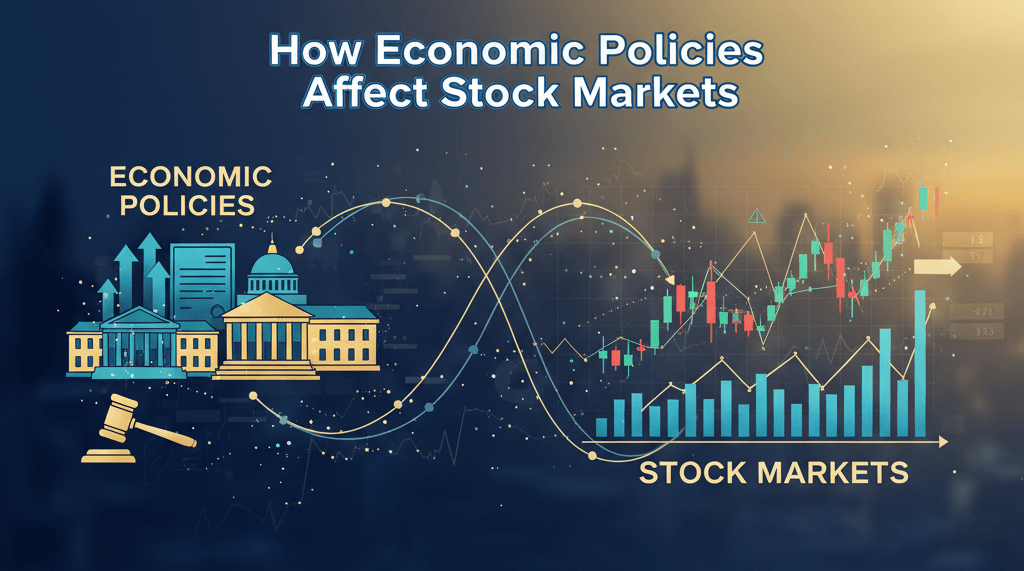How Economic Policies Shape Stock Markets?
How Economic Policies Shape Stock Markets?
Global stock market trends are significantly influenced by economic policy. Decisions like taxes, government spending, interest rates, and trade can have a significant impact on Wall Street in the United States, where the stock market is sometimes regarded as a gauge of economic confidence. Since these policies affect capital flows, profitability, and the prognosis for general growth, investors, businesses, and financial institutions keep a careful eye on them.
We will examine the ways in which global trade decisions, taxation, inflation control, monetary policy, and fiscal policy affect stock markets in this thorough analysis. We’ll also examine why, in particular economic environments, some industries prosper while others suffer.
HSBC Cashback Credit Card 2025 – Benefits, Rewards & How to Apply?

The Relationship Between Stock Markets and Economic Policy
There is more to the stock market than meets the eye. Rather, it is intricately linked to the larger economy. Economic policies impact stock prices by determining consumer purchasing power, business profitability, and borrowing costs.
- Tax breaks and stimulus expenditure are examples of positive measures that can boost confidence and raise stock prices.
- Declining stock prices and cautious trading are frequently the results of restrictive regulations (such as increases in corporation taxes or interest rates).
Investors are prepared for these shifts. Based on anticipation, the market may occasionally rise before a policy is put into effect. At other times, it responds strongly to formal pronouncements.
The Impact of Fiscal Policy on Stock Markets
Government decisions regarding taxation and spending are referred to as fiscal policy.
Government Expenditure
Government expenditure increases on military, healthcare, and infrastructure have a direct positive impact on industries that depend on them. For instance:
- Construction, steel, and raw material stocks are increased by infrastructure bills.
- Spending on defense boosts the production of weapons and aircraft.
- Pharmaceutical and medical technology industries benefit from healthcare allocations.
Taxes
In general, tax cuts increase household expenditure and corporate profits. Reduced corporation taxes, for instance, allow businesses to keep more of their revenues, which they can then reinvest or give back to shareholders. Stock values are frequently raised as a result.
Conversely, increased corporation or capital gains taxes may depress investor mood.
Changes in the Stock Market and Monetary Policy
One of the biggest factors influencing stock markets is monetary policy, which is managed by the Federal Reserve in the United States.
Rates of Interest
Interest rates are lowered to promote growth and raised to manage inflation by the Fed.
- Rising rates make borrowing costlier, slow corporate expansion, and reduce consumer demand. This typically pressures stocks, particularly in growth sectors like technology.
- Falling rates lower loan costs, boost housing demand, and support stock rallies, especially in banking and consumer-driven industries.
Quantitative Easing and Tightening
When the Federal Reserve buys assets (quantitative easing), liquidity increases, making stocks more attractive. Conversely, quantitative tightening drains liquidity, often leading to volatility.
The Quiet Market Shaper: Inflation
Money loses purchasing power due to inflation. Healthy demand and economic expansion are frequently indicated by moderate inflation, which helps sustain profits. High inflation, however, lowers consumer spending, puts pressure on profit margins, and compels the Fed to raise interest rates.
- Winners during inflation: Since the prices of commodities, energy, and real estate increase in tandem with inflation, these sectors frequently reap the benefits.
- The consumer discretionary and technology sectors, which mostly depend on stable borrowing prices, usually suffer during inflation.
Trade Regulations and International Market Responses
Stock markets are directly impacted by trade deals, tariffs, and penalties.
- Import taxes put pressure on earnings by raising manufacturing costs for businesses that depend on imported commodities.
- Free trade agreements help exporters by opening up new markets.
- Uncertainty brought on by trade conflicts and sanctions causes stock values to fluctuate.
Investor Attitudes and Federal Reserve Decisions
Investors keep a close eye on all Federal Reserve announcements. The Dow Jones, S&P 500, and Nasdaq can all see large fluctuations in response to even minor linguistic shifts in Fed minutes.
Concerned about inflation, a hawkish approach indicates rising interest rates, which frequently trigger stock sell-offs.
Impact of Economic Policies by Sector
Different industries react differently to changes in policy:
- Technology: Because they depend on growth finance, they are sensitive to interest rates.
- Banking: Take advantage of rising interest rates, but if rates increase too much, you run the risk of loan defaults.
- Government expenditure benefits the healthcare industry, but regulatory reforms pose concerns.
- Energy: Closely related to international trade, inflation, and laws.
- Consumer goods are largely influenced by trends in inflation, taxes, and household income.
Investor Behavior: Reaction versus Anticipation
Typically, markets move in two stages:
- Expectation: Before a policy is formally implemented, traders set its price.
- Reaction: Markets adapt to the practical effects of policies once they are implemented.
Because investors may have already factored in the worst, this explains why stocks can occasionally rise in spite of bad economic data.
Historical Instances of the Influence of Policy
- Reagan Tax Cuts in the 1980s: Lower corporate taxes fueled economic expansion and stock market increases.
- 2008 Financial Crisis Bailouts: Markets were revivified by stimulus expenditure and almost zero interest rates.
- 2020 Pandemic Stimulus: Despite a recession, equities reached all-time highs thanks to trillions in fiscal stimulus and Federal Reserve assistance.
Stability and Growth in Balance
The difficulty for policymakers is striking a balance between controlling inflation and promoting growth. Meanwhile, investors have to balance long-term fundamentals against short-term volatility.
Bull markets can be produced by a supportive fiscal and monetary environment, but equities may eventually experience corrections if inflation spikes or deficits are unsustainable.
In summary: How Economic Policies Shape Stock Markets?
One of the most important factors influencing stock market performance is economic policy. Every change in policy, from tax reforms to Federal Reserve interest rate choices, affects different industries and market sentiment.
It is crucial for traders, portfolio managers, and regular investors to be up to date on trade policies, inflation, taxes, and government expenditure. When paired with careful policy announcement monitoring, a well-diversified portfolio can assist manage the unavoidable
Why Networking Is a Financial Skill: Unlocking Wealth, Career Growth, and Opportunities
Why Networking Is a Financial Skill: Unlocking Wealth, Career Growth, and Opportunities
